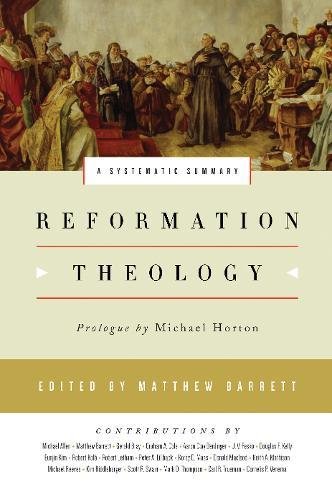A Brief Book Summary from Books At a Glance (Part 1)
By Steve West
Introduction
Reformation Theology: A Systematic Summary is a collection of essays by distinguished scholars on important themes in the theology of the Reformers. The essays cover a variety of essential theological topics, explaining both the agreements and disagreements amongst the Reformers and their schools. Each subject is treated with an eye to historical and theological accuracy, as well as to the importance and relevance of each topic.
This Summary (Part 1) covers Chapters 1-10.
Table of Contents
Prologue: Michael Horton
Chapter 1 The Crux of Genuine Reform
Chapter 2 Late-Medieval Theology
Chapter 3 The Reformers and Their Reformations
Chapter 4 Sola Scriptura
Chapter 5 The Holy Trinity
Chapter 6 The Being and Attributes of God
Chapter 7 Predestination and Election
Chapter 8 Creation, Mankind, and the Image of God
Chapter 9 The Person of Christ
Chapter 10 The Work of Christ
Chapter 11 The Holy Spirit
Chapter 12 Union with Christ
Chapter 13 The Bondage and Liberation of the Will
Chapter 14 Justification by Faith Alone
Chapter 15 Sanctification, Perseverance, and Assurance
Chapter 16 The Church
Chapter 17 Baptism
Chapter 18 The Lord’s Supper
Chapter 19 The Relationship of Church and State
Chapter 20 Eschatology
Summary (Part 1)
Chapter 1: The Crux of Genuine Reform
Matthew Barrett
Although many try to understand the Reformation as something brought about by sociological phenomena, at its heart it was religious and theological. There had been a call to reform the morals of the church, but the Reformers saw that the primary need was a recovery of the gospel. Luther believed that the church had corrupted the gospel, and it was a realization of the truth of sola fide and sola gratia that set him free. Sola scriptura was the formal principle of the Reformation, and it was the Word of God taught and preached that was the hallmark. In Reformed churches, preaching replaced Mass at the center of church life. Preaching engendered true worship and guarded against idolatry. It was a sacrament that fed God’s people. In preaching, the gospel and glory of Christ was held out for salvation—penance and ritualism were abandoned. Even though the preacher is sinful and fallible, the preached Word is owned by God and he speaks to his people by it. Sola scriptura was the basis for the preacher’s authority. The written Word was to be proclaimed, and the Holy Spirit used the proclamation of the Word to regenerate souls. Calvin strictly followed a method of biblical exposition that was sequential, since every passage was from God and should be received as such. Reformed liturgy was saturated with Scripture and services were built around it. Reformed worship services were not showy; on the contrary, they focused on God’s Word. Today, we need to recover the Reformation emphases. There are challenges to right doctrine from both outside and inside the camp of confessing evangelicals. Rediscovering Reformation theology and examining our historical heritage is a necessity for the contemporary church.
Chapter 2: Late-Medieval Theology
Gerald Bray
The Reformers were concerned with the nature of grace and how it is received. They were combatting a sacramentalism that was based on Lombard’s Sentences. He maintained that there were seven sacraments, and that the Eucharist was at the heart of the system. Although its origins are opaque, transubstantiation became an official dogma in 1215. Lombard taught that inner penance was necessary for salvation, and that this should manifest in external acts and confession. Partaking in the Eucharist became necessary for penance, and it could be done for the living on behalf of the dead. Many died without undertaking the necessary penitential acts, and although their original sin was washed away in baptism, they needed purgatory to cleanse them. Those in purgatory could be aided by the works and gifts of the living. Since the church supervised penance in this life, it could also continue that process for souls in purgatory; it was this idea that justified indulgences. Many rejected the new doctrinal innovation of. . .
[To continue reading this summary, please see below....]The remainder of this article is premium content. Become a member to continue reading.
Already have an account? Sign In
